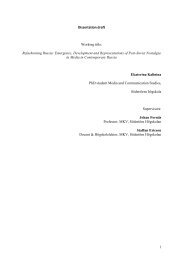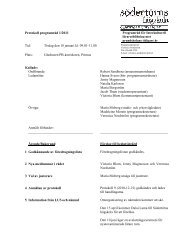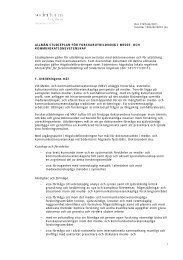Underlying Reasons for the Persistence of Female Genital Mutilation
Underlying Reasons for the Persistence of Female Genital Mutilation
Underlying Reasons for the Persistence of Female Genital Mutilation
Create successful ePaper yourself
Turn your PDF publications into a flip-book with our unique Google optimized e-Paper software.
consequences <strong>of</strong> <strong>the</strong> urine and menstrual blood that cannot escape naturally, which results in <strong>the</strong><br />
discom<strong>for</strong>t, odour and infection 54 .<br />
4.3 Motives behind <strong>the</strong> practice <br />
Whatever varied perception or reason behind <strong>the</strong> practice <strong>of</strong> FGM, <strong>the</strong>re seems to be a common<br />
thread running through traditional societies that <strong>the</strong>se are male dominated societies where<br />
resources and power are generally under male control 55 . However it is inaccurate to suggest that<br />
all women are under that generalisation. As stressed by Dorkeeno, it is important to know that<br />
some women benefit from a certain degree <strong>of</strong> authority within socially prescribed roles and even<br />
in oppressive situations you can come across extremely strong women who defy all kinds <strong>of</strong><br />
suppression 56 .<br />
As pointed out earlier and motivated by various perceptions, <strong>the</strong> practice <strong>of</strong> FGM is not<br />
presented to women in a straight <strong>for</strong>ward manner. It has been covered in mystery, magic and<br />
fear. Women who undergo FGM receive social approval and gain certain benefits; being<br />
marriageable and through marriage, having access to resources in <strong>the</strong> community 57 . All <strong>the</strong><br />
communities practicing FGM have <strong>the</strong> similar <strong>the</strong>me with <strong>the</strong> concept <strong>of</strong> becoming a woman and<br />
being raised to a higher status. In terms <strong>of</strong> gender roles FGM marks <strong>the</strong> difference <strong>of</strong> sexes in<br />
preparation <strong>of</strong> <strong>the</strong>ir future roles in life and marriage 58 . In Some communities, when belonging to<br />
an ethnic group, one <strong>of</strong>ten has to follow certain obligations in order to become a full member <strong>of</strong><br />
that group. These obligations <strong>of</strong>ten include following rules and regulations whatever <strong>the</strong>y may be<br />
within <strong>the</strong> group, to contribute and defend <strong>the</strong> groups’ cultural base. Cultural identity or<br />
belonging to a linage group is considered very important to most African families. Given that<br />
parents want <strong>the</strong>ir children to become a part <strong>of</strong> <strong>the</strong> society and pass on <strong>the</strong> culture, <strong>the</strong> practice <strong>of</strong><br />
FGM centres <strong>the</strong> full social acceptability and integration upon females and assigns status and<br />
value to <strong>the</strong> girl or woman, as well as to her family 59 .<br />
54 Dorkeeno, Cutting <strong>the</strong> rose, p. 40 <br />
55 Ibid, p. 45 <br />
56 Ibid, p. 46 <br />
57 Ibid <br />
58 Mwaipop, Law and practice relating to FGM in Tanzania, p. 47 <br />
59 ibid <br />
23

















